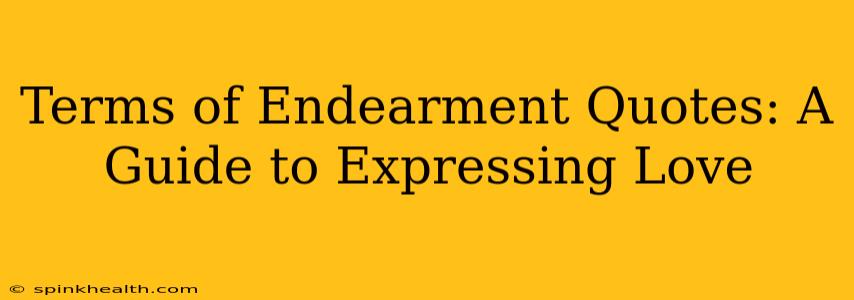Finding the perfect words to express your love and affection can be challenging. Whether you're looking for a romantic declaration, a heartfelt message for a friend, or a simple way to show your appreciation for family, the right words can make all the difference. This guide explores the power of terms of endearment and offers a range of quotes to help you articulate your feelings. We'll delve into different types of endearments, their meanings, and how to choose the perfect one for your loved one.
What are Terms of Endearment?
Terms of endearment are words or phrases used to express love, affection, or fondness for someone. They can range from simple and common terms like "honey" or "sweetheart" to more unique and personalized expressions that reflect the specific bond you share. These terms are more than just words; they represent the emotional connection and intimacy between individuals. Choosing the right term shows you care enough to find the perfect expression of your feeling.
Why are Terms of Endearment Important?
Using terms of endearment strengthens relationships by fostering a sense of closeness and intimacy. They communicate love and appreciation in a way that transcends mere words. Regularly using endearing terms can:
- Boost intimacy: They create a shared language of love and affection unique to your relationship.
- Enhance emotional connection: They signal warmth, care, and understanding, deepening the bond between you and your loved one.
- Reduce stress and improve mood: Hearing loving words can have a positive impact on your emotional well-being.
- Improve communication: They create a positive and supportive atmosphere for open and honest communication.
Different Types of Terms of Endearment and Their Meanings
The best term of endearment depends on your relationship and personal preferences. Here are some common examples and their subtle nuances:
- Honey/Sweetheart: Classic and versatile, these terms express general affection and sweetness.
- Love/Darling/My Love: More romantic and passionate, these terms convey deep love and desire.
- Babe/Baby: Often used in romantic relationships, implying a sense of playful intimacy.
- Sweetie/Pumpkin: Cute and endearing, suggesting a playful and affectionate bond.
- My Dearest/My Love: Formal yet affectionate, these terms suit more traditional or established relationships.
- Champ/Tiger: Terms of endearment demonstrating pride and admiration for someone's strength or spirit.
- Friend/Buddy: Demonstrates affection within platonic relationships.
Famous Terms of Endearment Quotes
Many famous works of literature and cinema showcase the power of endearment. Here are a few examples:
- *"I love you more than words can say." * - A timeless classic expressing the depth of love beyond simple words.
- "You are my best friend, my human diary, and my lover. You are the best of me." - A quote expressing a multifaceted, deeply loving relationship.
- "You complete me."- A quote signifying finding your missing piece in another person.
How to Choose the Perfect Term of Endearment
The perfect term of endearment is one that feels natural and comfortable for both partners. It's about finding a word or phrase that truly resonates with the unique dynamic of your relationship. Consider:
- Your relationship's history and intimacy level: A new relationship might benefit from less intense terms than a long-standing one.
- Your partner's personality and preferences: Pay attention to what your partner responds to positively.
- Your personal style and communication preferences: Choose terms that feel authentic to your way of expressing love.
- Experiment and have fun: Don't be afraid to try different terms and see what feels right.
Beyond Words: Actions Speak Louder
While terms of endearment are powerful, they are only part of expressing love. Remember that actions, such as quality time, thoughtful gestures, and consistent support, are equally important in strengthening relationships. Terms of endearment should be a compliment to, not a replacement for, genuine affection and care.
Frequently Asked Questions
What if my partner doesn't like terms of endearment?
Respect your partner's preferences. If they don't enjoy being called pet names, don't force it. Focus on other ways to express your love and affection.
Are terms of endearment only for romantic relationships?
No! Terms of endearment can be used in any close relationship, including friendships and family relationships.
How do I know if a term of endearment is right for my partner?
Pay attention to their reactions. Do they smile, blush, or seem uncomfortable? Observe their response and adjust accordingly.
Can terms of endearment change over time?
Absolutely! As relationships evolve, so might your preferred terms of endearment. What felt right in the beginning might not feel right years later. Embrace the changes and adapt accordingly.
By understanding the power and versatility of terms of endearment, you can enrich your relationships and express your love in a meaningful and personal way. Remember, it's not just about the words themselves, but the genuine affection behind them.

